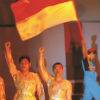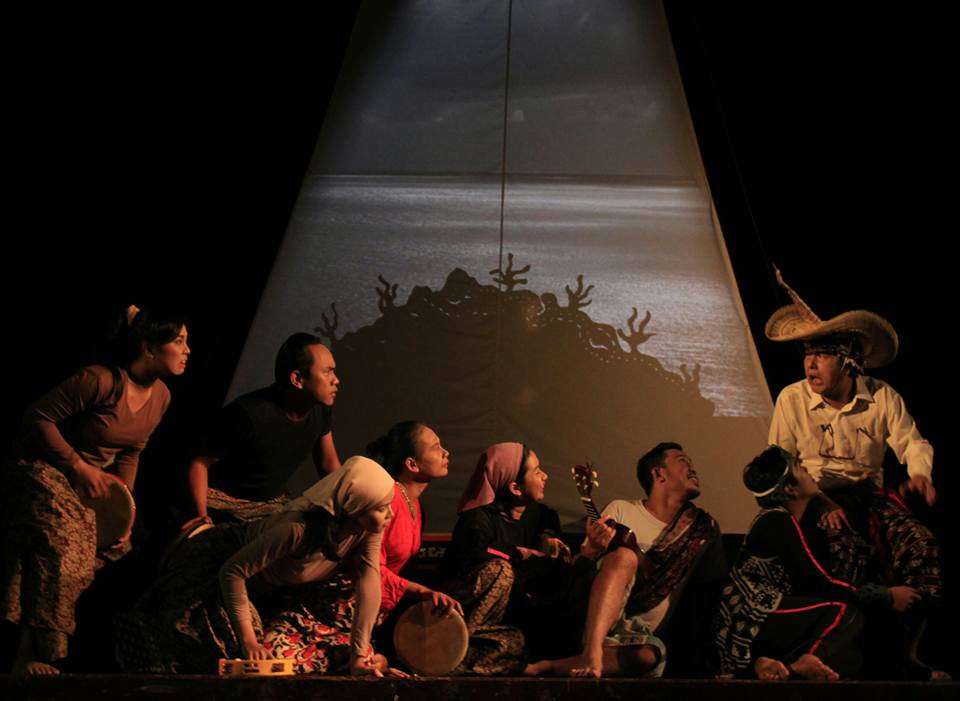Indonesia’s foremost theatre director, the internationally acclaimed Iswadi Pratama, staged an extraordinary eight productions in 2016
Indonesia’s foremost theatre director, the internationally acclaimed Iswadi Pratama, staged an extraordinary eight productions in 2016
There is no simple way of describing Iswadi Pratama. He claims to be a self-taught artist, yet his exceptional talents seem to suggest otherwise. Having spent most of his life bringing realities to the stage he insists that he only has the books he reads (stacked quite untidily at his private library) and the mentors who have guided him in the past to thank. Yet, after staging eight ambitious productions in 2016, it would be hard to dispute the fact that he has revolutionised Indonesian theatre.
The 45-year old poet and theatre director always knew that art was his true calling. He considers it to be the only space where he can express himself unapologetically, while also being a vehicle for helping others. ‘Everything that I do is motivated by an awareness that art must make people find their turning points in life,’ he says. ‘So I always choose projects based on [various] priorities: to what extent do the people involved in a certain program require my ability and capacity, and the relevance of it to my creative work and my vision regarding social transformation.’
Pratama’s plays have been showcased around the globe. His play Nostalgia di Sebuah Kota (Nostalgia in a City) was translated and performed in Germany in 2010. He has worked with some of the best artists in the world including American director Julie Taymor (Frida, The Lion King stage musical) who mentored Pratama when he became the first Indonesian to be a part of the Rolex Mentor and Protégé Arts Initiative.
At the same time, he feels that it is his responsibility to share what he has learnt so he regularly travels to smaller regions across the archipelago to stage performances or to organize workshops that aim to expand the horizons of modern theatre in Indonesia.
The teacher
Over a few months in 2016, I had the opportunity to observe Pratama’s work with Teater Satu, which he founded with his wife Imas Sobariah in 1996. Most of their time is spent rehearsing in a studio located at Pratama’s house in Bandar Lampung, Sumatra. Along with Sobariah – who is also the manager, a playwright and an actor at Teater Satu – Pratama trains his team to be not just actors, but creative professionals equipped with an array of skills, such as writing, directing and all that it takes to run an arts organisation. It is perfectly obvious that his company of actors and crew have a great deal of respect for him. He welcomes them as his family. And in this family everyone is encouraged to speak their minds, discuss and critically evaluate the work and its processes.
Teater Satu’s lighting designer Ahmad Jusmar has known Pratama since junior high school. He describes him as a director with the ability to bring everyone together. ‘His leadership style is unpretentious. He doesn’t position himself as a powerful man. To him, this group belongs to us all because we built it together. And that kind of approach is why we are all still here,’ Ahmad tells me.
But if there is one thing that Pratama will not tolerate, it is ‘exhibitionism’. He often quotes Russian theatre practitioner Konstantin Stanislavsky – whose acting method has served as a great influence throughout Pratama’s career – and reminds his students to ‘love art in yourself, and not yourself in art’.
For Pratama, theatre is not a place for showmen to parade their talents, but rather a vehicle for something much more important. I notice that his actors are in a sense comparable to message-bearers. Their mission is to capture the spirit of the text and deliver it to the audience. Everything else should be counted as secondary. And in order to achieve that, actors must be willing to commit themselves to the endless and painstaking process of learning, self-discovery and soul-searching under Pratama’s guidance.
One of his students at Komunitas Salihara, theatre actress Sha Ine Febriyanti, who starred in two of Pratama’s productions last year (Lear Asia and Visa), believes Pratama works best when he is able to ‘connect with his actors, both mentally and emotionally [...]. He is like a puppeteer that brings the puppets to life and he touches upon each actor with different approaches, depending on the person’s emotional and intellectual capacity’.

Sha Ine Febriyanti in a production of Lear Asia / Teater Satu
The work
Whilst the simple feat of directing eight plays in 12 months is extraordinary in and of itself, the sheer range of works Pratama has taken on makes this an even more stunning achievement. The works ranged from interpretations of Chekhov and King Lear to staging his self-penned comedy, renditions of Rendra’s poetry, and a collaboration with an Australian playwright.
Lear Asia, a reworking of King Lear by Rio Kishida, is a heartbreaking tale that exposes Pratama’s craft in exploring characters’ psychological complexity. In Barabah dan Penagih Hutang (Barabah and the Debt Collector), he takes a plunge, merging texts by Lampung-based writer Motinggo Busye and Russian playwright Anton Chekhov into one amusing yet affecting spectacle. In the restaging of Goenawan Mohamad’s Visa, he deconstructs the taken-for-granted meaning of ‘American dream’ by unveiling its contentious nature. In Sandra Thibodeaux’s The Age of Bones, he reasserts why theatre is the perfect medium for representing real and powerful stories. His original comedy Hikayat Pendekar Cidera (The Injured Warrior Saga) is a sharp instrument for laughter. And the monologue Ode Untuk Cinta (Ode to Love), an adaptation of renowned dramatist WS Rendra’s short essays, formed a sweet yet soul-steering finale for last year.
But Pratama’s best and most groundbreaking play – alongside Lear Asia – was his revival of Eugene Ionesco’s The Chairs. The play was performed in Japan in August 2016 after Pratama was selected by the Japan Foundation to represent Indonesia at last year’s Asian Theater Directors’ Festival. It is not the easiest play to present, even by Pratama’s standards. The language, for the most part, is to blame. The play focuses on two actors engaging in a conversation with invisible guests and the language is Ionesco’s classic absurdist text. To play it for an audience of mainly non-English speakers especially challenging. To get around this issue, Pratama’s version was performed by nine actors in five fragments.

Teater Satu rehearses The Chairs in Japan / Teater Satu
When The Chairs was showcased at the festival, audiences were instantly polarised. On one side, Pratama’s fresh innovation was highly praised. Yet at the very same time it aroused criticism among traditionalists who found it difficult to consider his reinvention of The Chairs as Ionesco at all. When I asked Pratama what he thinks about those who question his version of The Chairs, there is a hidden yet strong yearning for someone to understand the unusual choices he made. Regardless, he is quick to reorient his focus to what matters the most at the end of the day: the audience.
‘I could have done it the same way it’s been done for over the past few centuries: relying on two actors, invisible guests, empty chairs and all that. But why would I?’ he reflects. ‘Yet I do not expect the audience to completely understand the thinking and work I’ve put into this production. They don’t need a complicated explanation. But when they come and say “Thank you, your performance touched my heart”, then that’s all that it takes. Then I know that what came from my heart has found its way to theirs, and that means a great deal.’
The student
When approaching a new play Pratama is not the kind of director who uses his own perspective as a starting point. On the contrary, he always begins by asking what the writer is intending to communicate, and treats the text as if it were his holy Qur’an.
Before working with his actors, Pratama will evaluate the script, dissecting its plot and characters while further exploring its universe. In preparation for the play Visa, he distributed a 12-page analysis to his actors and even to the playwright and producer Goenawan Mohamad himself, explaining that he wanted to ‘honour the text’. This isn’t someone who only cares about stroking his ego in his artistic works. He sought to approach The Chairs in the same manner.
Though most of his productions have been regarded as successes, Pratama is not quite sure how he found the strength to work on so many in such a limited period of time. He has a great team behind him that he considers to be one of his ‘blessings’. But still he seems to struggle to make sense of the experience himself. ‘I just feel that theatre has been a part of myself and the way I breathe,’ he explains.
I ask him what he would do if he were not an artist or a theatre director. His answers surprise me: ‘Probably a soldier, a farmer, an ulema, or a professor’. In the end however, he is glad that art and theatre became the only path he knows.
For more about Iswadi Pratama and Teater Satu's work, click here.
Related articles from the archive
 |
Sep 26, 2016 |
|
 |
Jul 23, 2013 |
|
 |
Jul 24, 2010 |



